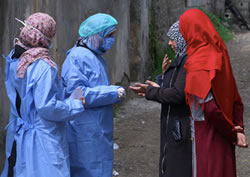The UNFPA* says millions more cases of violence, child marriage, female genital mutilation and unintended pregnancy are expected due to the pandemic.

Outreach workers in Syria are worried about the vulnerability of women and girls under curfew. Photo: UNFPA Syria
A clear view of the toll of the COVID-19 pandemic is only beginning to take shape, but experts estimate the human cost could be extraordinary.
The economic and physical disruptions caused by the disease could have vast consequences for the rights and health of women and girls, a new analysis by the United Nations Population Fund (UNFPA) and partners shows.
Significant levels of lockdown-related disruption over six months could leave 47 million women in low and middle-income countries unable to use modern contraceptives, leading to a projected 7 million additional unintended pregnancies.
Six months of lockdowns could result in an additional 31 million cases of gender-based violence.
The pandemic is also expected to cause significant delays in programs to end female genital mutilation (FGM) and child marriage, resulting in an estimated 2 million more cases of FGM over the next decade than would otherwise have occurred.
These delayed programs, on top of growing economic hardships globally, could result in an estimated 13 million more child marriages over 10 years.
These figures — produced in collaboration with partners Avenir Health, Johns Hopkins University (USA) and Victoria University (Australia) — are rough estimates.
A great deal is still unknown about how the pandemic, and the response to it, will unfold around the world.
But together, the projections offer an alarming view of the future that could confront women and girls if efforts are not urgently made to secure their welfare and ensure their rights.
“This new data shows the catastrophic impact that COVID-19 could soon have on women and girls globally,” said Dr Natalia Kanem, UNFPA’s Executive Director.
Violence surges, support dwindles
The world is already seeing signs of a surge in violence against women and girls, with increased reports to domestic violence hotlines, crisis centres and justice officials.
The new assessment foresees two ways the pandemic could contribute to more gender-based violence.
The first is through disruptions in programs to prevent violence and provide services, care and support to survivors.
The second is through increased total acts of violence as lockdowns keep women inside with their abusers and as households endure stressors like economic turmoil.
Ghadeer Mohammed Ibrahim Qara Bulad has seen both of these factors play out already.
She is the Director of the Women’s Development Project at the Islamic Charitable Association, which works with UNFPA in Homs, Syria.
“During the curfew period, I have met a lot of woman who face violence by their husbands,” she told UNFPA.
“It has clearly increased.”
Many safe spaces have been closed, Ms Bulad said, meaning that for those in abusive relationships, “the woman has been imprisoned in the house”.
She also witnessed abuse firsthand while visiting families to raise awareness about disease prevention efforts: “I saw a woman being beaten by her husband during the curfew, as the husband lost his job and the woman was unable to control their nine children,” she recalled.
“One woman told me that she is exposed to intimate violence from her husband, repeated on a daily basis, since he had lost his job.”
“I also saw a wife being beaten in front of her children.”
Diminished choice
The world is also already seeing widespread disruptions in family planning services.
In many places, health facilities are closing or limiting services.
Where health systems are overwhelmed with COVID-19 cases, clinical staff may not have the time or personal protective equipment needed to provide family planning counselling and commodities.
In some places, women are refraining from visiting health facilities due to movement restrictions or fears about COVID-19 exposure.
Additionally, supply chain disruptions are limiting the availability of contraceptives in many places.
Over the next six months, stock-outs are anticipated in more than a dozen of the lowest-income countries.
On top of all that, UNFPA anticipates significant delays in planned efforts to scale-up access to family planning for the most vulnerable and marginalised populations.
The assessment looks at different possible degrees of service disruptions, and different lengths of disruptions.
A minimal three-month duration of lockdown, with minimal service disruptions, would leave an estimated 13 million women unable to use modern contraceptives, resulting in 325,000 unintended pregnancies.
In the most severe scenario, with significant service disruptions lasting for a full year, 51 million women would be unable to use modern contraceptives, resulting in 15 million unintended pregnancies.
“The pandemic is deepening inequalities, and millions more women and girls now risk losing the ability to plan their families and protect their bodies and their health,” said Dr Kanem.
Millions of girls at risk
FGM and child marriage are also projected to increase, in large part due to delays in the implementation of programs to end these harmful practices.
Programs addressing these harmful practices are often communal, involving the exchange of information and perspectives.
Without such programs, UNFPA’s analysis estimates that 2 million additional cases of FGM could take place over the next decade that otherwise would have been averted.
Similarly disrupted efforts to end child marriage will result in millions more child marriages over the coming 10 years.
And because poverty is a known driver of child marriage — with families more likely to marry off daughters in times of economic stress to alleviate the perceived burden of caring for them — the anticipated economic fallout of the pandemic is expected to result in millions more early marriages.
Together, it is expected that 13 million more child marriages could take place by 2030 than would have otherwise.
But this does not have to be our future, Dr Kanem emphasised.
The world can take steps to ensure continued access to reproductive health care and to protect the rights and dignity of all women and girls.
“Women’s reproductive health and rights must be safeguarded at all costs,” Dr Kanem said.
“The services must continue, the supplies must be delivered, and the vulnerable must be protected and supported.”
* UNFPA is the United Nations for sexual and reproductive health.
This article first appeared at www.unfpa.org.




